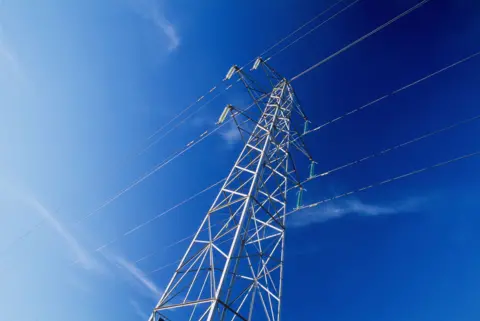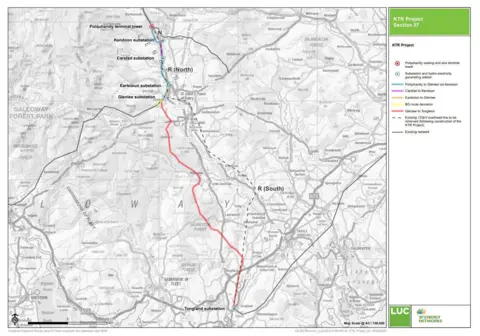Power lines plan a kick in the teeth - campaigners
 Paul Swift
Paul SwiftOpponents of plans to replace 27 miles (43km) of overhead power lines in south-west Scotland have described their approval by the Scottish government as a "kick in the teeth" for the community.
A public inquiry was held into the Kendoon to Tongland scheme and reporters ultimately recommended refusal.
However, ministers decided that protecting energy supplies for about 30,000 residents meant the project should proceed.
Paul Swift of the campaign group Galloway Without Pylons (GWP) said it showed the government had "no empathy for the views of people living and working in rural areas".
Approval for the project was confirmed on Friday after a very lengthy planning process.
The network in the area was constructed in the 1930s and is considered to be at the end of its life.
Mr Swift said the decision to give the go-ahead was "disgraceful" after the local community had fought for seven years to get the lines put underground or rerouted.
"It makes no sense to put the pylons through the Galloway Forest Park which is the most popular natural tourist attraction in Dumfries and Galloway," he said.
He said the government had spent hundreds of thousands of pounds on a public inquiry which had listened to both sides of the debate.
 Getty Images
Getty Images"There were almost 1,000 representations sent to the Energy Consents Unit and not a single one was in favour of the proposed route," he added.
"The reporters' determination was to reject the planning application.
"The reporters were appointed and paid for by the Scottish government and then their recommendation was overturned."
Mr Swift said the local community had raised £25,000 to pay for legal advice and an energy expert to help GWP make its case at the public inquiry.
"I thank everyone again for their support and can only apologise if they think that their hard-earned money was wasted," he said.
"The only option available now is a judicial review - which will cost even more money.
"The only conclusion I can make is that democracy in Scotland is dying and that the government has no empathy for the views of people living and working in rural areas. Perhaps they don't even care at all."
'Outdated infrastructure'
The Scottish government said the project would replace "outdated infrastructure" which could no longer be maintained while avoiding the risk or power outages and increasing renewable energy provision to the network.
"Any potential impact on communities and our natural environment will always be forefront in considering any planning application," said a spokesperson.
"But in this particular instance ministers have decided that the benefits of protecting the security of electricity supply for around 30,000 residents and providing low carbon energy to the network means that consent should be granted to this application."
 SPEN
SPENSP Energy Networks said it welcomed the approval for its plans.
"This decision allows us to move forward with our essential work to replace the existing 80-year-old line to improve the security of supply to thousands of homes and businesses, including hospitals and schools, in the area," said a spokesperson.
"This project is nationally significant, enabling Scotland's ambition to electrify by creating much more capacity on the grid to allow new generation to connect in."
The company added that it had "decades of experience" in delivering such lines while "working to rigorous environmental standards".
It said the new lines would ensure communities were served by an electricity network that could "adapt to changing needs for decades to come."
